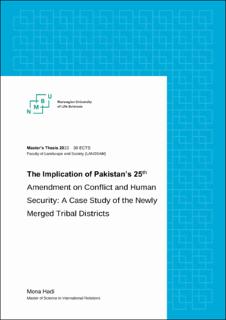| dc.description.abstract | The Federally Administered Tribal Areas in north-western Pakistan have been plagued with conflict for decades, which have taken thousands of lives and adversely affected the lives and security of the tribal people. In 2018, the tribal areas were merged with the Khyber Pakhtunkhwa province in an effort to mainstream the area and improve the severe security situation. This thesis is a case study of what, after 2018, is known as the Newly Merged Tribal Districts. The aim of this thesis is to examine the political, social and economic dimensions of this merger, and how it has affected the people’s sense of security. Focusing on human security, this thesis argues a human-centred security approach is necessary to safeguard the individuals’ sense of security during and after violent conflict. While there are likely countless factors that impact the rebuilding process of a post-conflict study area, this thesis has identified weak institutions, mistrust, ignorance of cultural context and displacement as detrimental to the security of the local people in the NMTDs. | |
